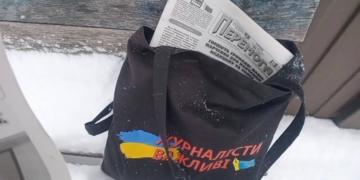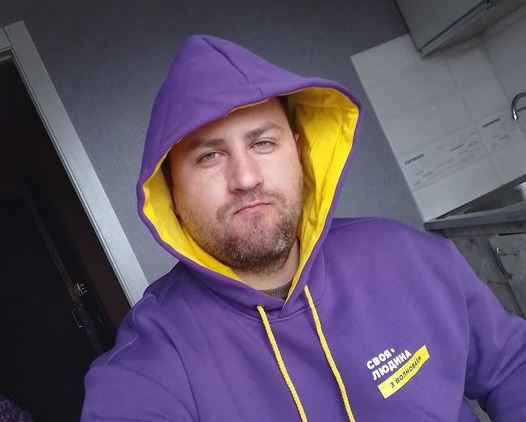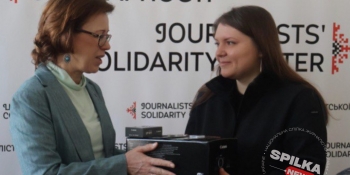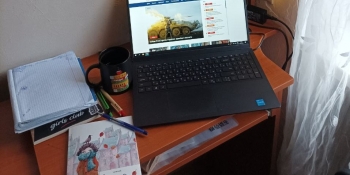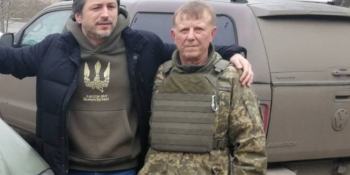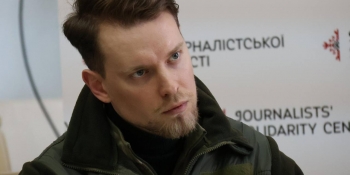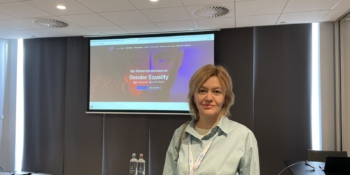Overnight into February 24, Pavlo, the editor and founder of the Volnovakha.City website, did not sleep. By that time, he had had a fever for several days. It was two o’clock in the morning, when suddenly the city shuddered from a powerful explosion. The room was flooded with bright light, somewhere on the street, glass was falling from the windows of high-rise buildings. Volnovakha is a frontline city, and during the nine years of war in the East, Pavlo had heard explosions more than once, but this time everything was different.
“I woke my wife up and while she was scrolling through the news, I ran outside to look around. I came back, and she told me “the war has started, the Russian Federation has started shelling big cities such as Kyiv and Kharkiv, ” recalls Pavlo Yeshtokin. “So, let’s put things in the car. We had not packed an emergency suitcase, because we did not believe that it would be a full-scale invasion. Although, we were ready for the war, as, for us, it started back in 2014.
At dawn of February 24, Pavlo went to the gas station. Lines of cars were already gathering there, but there was still fuel there. Someone was excitedly withdrawing money from cash machines, and someone was just going to work, minibuses ran through the city. Local residents did not fully understand that their lives would change forever in a few hours.
“My wife and I made the decision to leave the city early in the morning. We thought, if everything is calm, then we will return. At that moment, I understood that our city was full of enemy collaborators. Why did we understand that? A month before the beginning of these events, in Volnovakha, apartments suddenly began to be rented for a short period and only by men. That seemed suspicious. So, on February 24, around ten in the morning, my family and I left for Zaporizhzhia. The wife looked for places in nearby hotels all the way, but everything had been booked. We drove along the Mariupol-Zaporizhzhia Highway, it was just opened, a high-quality, modern road. And now it was all in cars. Even then, convoys were moving from Mariupol,” the journalist said.
Pavel’s first stop with his family was in the city of Polohy, in the Zaporizhzhia Region. But the family was always looking for a house in the village where they could live for a certain time. Finally, a woman “volunteer” came to them and offered them a place to live in the village of Kinski Rozdory.
“The house was comfortable, stocked with firewood, had a fireplace. We decided to stay there. I learned to heat the stove in a day. On the second day, we woke up and saw Volnovakha being shelled. We read the news and saw residential buildings being shot at. I never thought that in this war the military would fight with the civilian population.
Pavlo immediately started working at the new place. In the group on Facebook, where he had 19,000 users, he began to post announcements about the search for people and evacuation from Volnovakha.
“We made lists of those who left. We posted them on FB so that people could see that maybe their relatives were among them. A Facebook group was created for people to discuss evacuation issues. And they published a video of what is happening in Volnovakha. Not all people left. And not only because they were waiting for so-called ‘russian world’, but also because of fear. I know a cameraman, he is for Ukraine, but he didn’t leave because he couldn’t overcome his fear. After all, during one evacuation, a bus with civilians was shot, and the local propaganda spread the word that Ukraine was shooting its own people. That’s how we had to work then,” says Pavlo Yeshtokin, “But it didn’t last long, because the lights were turned off in Volnovakha, people’s phones ran out of power.
Likewise, the Yeshtokins did not stay long in the village of Kinski Rozdory. Seven days later, blackouts had come there, and it became clear that the war was moving deep into Ukraine.
“I had an extra car battery and a transformer that turns 12 volts into 220 and that’s how we provided light in the house. There was no Internet on the phone. Work has stopped. We were just listening to the radio. On the third day, we already heard explosions of shells and the hum of a helicopter. On the seventh day, we woke up and went to the city of Huliai Pole. While we were driving, a call from a father got through, he said that he and his family had been evacuated from Volnovakha. And as soon as we settled in Huliai Pole, the occupiers seized Polohy. I already had to spend the night in a bomb shelter. The wife and a child fell asleep a little. I spent the whole night deleting information from my phone. I understood that it might happen that I would have to go through the block post of the occupiers. And the next morning we went straight to Dnipro. A subscriber of our site offered us to live in her apartment,” said Pavlo.
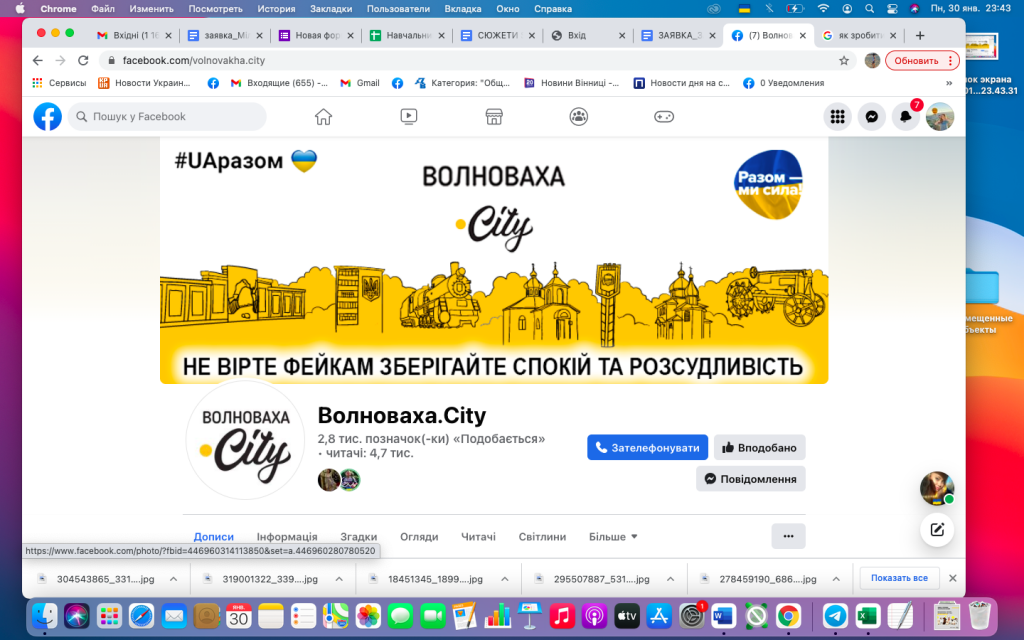
On the twelfth day of the war, Volnovakha was completely occupied. The hope that soon everything would be over, and it would be possible to return home finally faded. Pavlo lived in Dnipro for a month, and at the family council, he decided to move to a small town where he can revive his business. Despite the difficult situation in the country, a new plan was already evolving in the journalist’s head.
“I have a friend in Zhovti Vody. He offered an apartment and we agreed. It was difficult at first. But I focused and started looking for equipment, first of all, in order to launch a site. Because when we left, the equipment remained in the office. Then the office was ransacked in Volnovakha. Everything we had was “only a laptop,” the journalist recalled. We found financing, bought a camera, a voice recorder, and a microphone. Funding was found for the laptop. This is how the equipment was restored. Then we started to rebuild the team. One girl from our team also went to the Central part of Ukraine. She gave birth to a child and is now working online.
For two or three weeks in Zhovti Vody, all Pavlo did was writing letters to various organizations asking for help. The first to respond was the Kyiv Journalists’ Solidarity Center (JSC) of the NUJU.
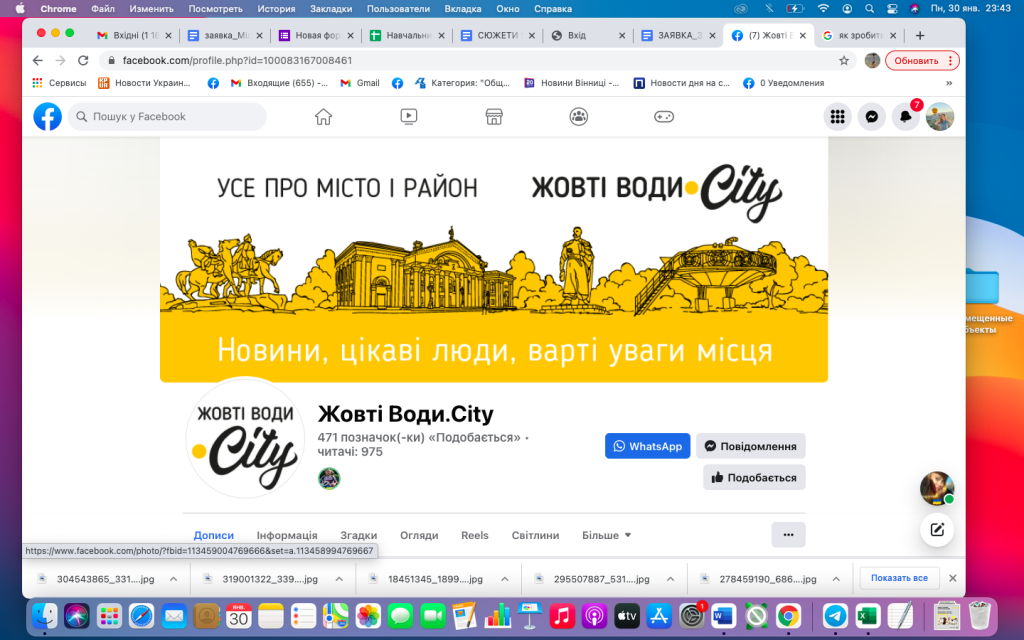
“The first equipment we received was from the NUJU. Illia Suzdaliev offered help,” says Pavlo Yeshtokin. “I just needed a camera. A lens, a bag. Now a journalist from our new site Zhovti Vody.City work using this camera. And the bag was given to us at the JSC. There is such a shockproof bag that you can take it to the mountains, very cool. I also asked the JSC for a bulletproof vest, a helmet, and a medical jacket, they gave me all that. Protective items are of very high quality.”
To support a journalist during the war “is the main mission of the JSC of the NUJU. The equipment and things that were given by the NUJU to Pavlo were provided by Swedish media companies through the Ukrainian Media Fund initiative. It was initiated by the Polish Gazeta Wyborcza together with partner organizations of media companies in the Scandinavian countries. Thanks to the strong support of colleagues, the Information site Zhovti Vody.City soon appeared in a small town in the Dnipropetrovsk Region. This was the new business plan Pavlo carried in his head the whole time he left his native Volnovakha on February 24. And it was not for nothing that the journalist chose to live in a town with a population of 50,000 people rather than a metropolis. It is there, as a rule, there are no own information sites. Various agencies helped Pavlo Yeshtokin get back on his feet.
“From the very beginning, we have cooperated with the local media agency ABO. We launched our website in Volnovakha. They provided mentors who taught us how to run the site. And when the war started, they also offered to finance newly-created Zhovti Vody.City. Then Lviv Media Forum, Volyn Press Club, Anti-Crisis Media Center believed in us. They gave us topics, for example, to organize an interview with the mayor of the town of Vuhledar. And two months after we launched our project, public organizations cooperating with European donors paid attention to us. And they say, if you don’t give up and work, say what you need,” the media person said.
In four months of operation, the Zhovti Vody.City website gained 12,000 users. There are even the first orders from advertisers.
“We took the money and acted in a cunning way. Part of the money was given to the Volnovakha.City site, and the rest of the grant money was invested in the development of another information site, Zhovti Vody.City. They hired a girl from a local TV channel that had been closed. We pay her minimum wage. Later, they received a separate grant for her salary. Now, we have one grant for writing 28 articles about life in our town,” the migrant journalist said.

By the way, 12,000 users appeared on the Zhovti Vody.City website thanks to Pavlov’s observation.
“In Zhovti Vody, people only watched TV and read social media groups on FB. By the way, they [the groups] are our competitors. I kept thinking, well, how to make a lot of people learn about the site, start reading it, subscribe to it. And, an idea was born. There are many people who keep dogs in Zhovti Vody. There are so many dog breeds that even I don’t know some of them. Every third store in Volnovakha was a pharmacy, and here it is a veterinary clinic. And I decided to launch the “best four-legged friend” contest. 60 participants got involved. We posted photos of dogs, and people reposted and recommended our site. That’s how we got 7,000 subscribers in one fell swoop. Subsequently, we developed an information hub for the FIRST time on our website. We inform town residents about everything: bus schedules, presence of fuel at filling stations, its price, train schedules, current fare prices, whether MRI is working at the hospital. We inform about what people use every day. And of course, we write huge stories about successful people and their businesses. You know, our mission is to make sure that people don’t die of panic,” Pavlo Yeshtokin emphasized.
“You just have to look at business in a different way in conditions of war,” says the displaced journalist. “Then it’ll work and bring dividends.
“Now, I imagine as if I got into a community in the times before our era, where there are people who have to do business in this community, and I came like this and thought, oh, I will be the main informant. First, you should not count on the fact that you can earn a lot of money now. Secondly, now it is better to look for information that can help other people. Now there is a war and people have open internal flows of energy, from the point of view of helping others. Thirdly, tell people about people.
Like all people who lost their city because of the war, Pavlo dreams of Ukraine’s victory. He says he will immediately go to his small Motherland [his hometown]. But he has no plans to return. He wants to live and develop his business in Zhovti Vody.
JOURNALISTS ARE IMPORTANT. Stories of Life and Work in War Conditions is a series of materials prepared by the team of the National Union of Journalists of Ukraine with the support of the Swedish human rights organization Civil Rights Defenders.





